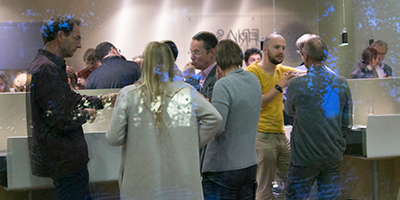Dinner Speech - Wolfgang R. Hess
Internal Senior Fellow
Faculty of Biology, Genetics and Experimental Bioinformatics
Universität Freiburg
| Wann |
07.11.2018 von 17:30 bis 19:00 |
|---|---|
| Wo | FRIAS, Albertstr. 19, Seminarraum |
| Name | Alison Sauer |
| Kontakttelefon | +49 (0)761 203-97362 |
| Teilnehmer |
universitätsoffen / open for university members |
| Termin übernehmen |
|
CRISPR-Cas systems in biotechnology, medicine, business and the public discourse
10 years ago microbiologists demonstrated for the first time the activity of an immune system in bacteria and certain other microorganisms, called “CRISPR-Cas systems”.
Looking back at this now, in November 2018, we can see that the discovery and deeper analysis of CRISPR-Cas systems is having consequences in at least 5 different dimensions:
(1) The dimension of fundamental research. Until 2008 it was considered impossible that such simple organisms could have anything even close to an adaptive immune mechanism. Yet, this activity has been proven since the original discovery, up to now in hundreds of vastly different microorganisms, and demonstrating substantial variations in the employed principles and mechanisms.
(2) Application in medicine and biotechnology. 4 years later, in 2012, the groups of Jennifer Doudna and Emmanuelle Charpentier jointly published their ground-breaking work that CRISPR-Cas systems can be used for the programmable editing of genomes. This is certainly the most exciting aspect in this regard, thousands of publications showed meanwhile that CRISPR-Cas systems can be modified and applied to genetically modify plants, humans, animals, basically any form of life and that these modifications can be executed in an unprecedented precise way. Therefore, it appears feasible now to correct inheritable diseases at the molecular level, or to accelerate breeding of new crops by means of precision breeding.
(3) The personal dimension. The discoveries around these findings shape the careers of a generation of researchers. Regarding Jennifer Doudna and Emmanuelle Charpentier – they became personal friends over their discoveries, but as J. Doudna said in a 2017 interview with the Guardian, it became difficult when they started seeing each other more often in the courtroom over patent disputes than at scientific conferences.
(4) The legal aspects. CRISPR-Cas systems have been at the center of several legal decisions at the highest level. On 10 September 2018, the U.S. Federal Court of Appeals ruled against Jennifer Doudna and UCLA at Berkeley and awarded the pivotal intellectual property for the application to human genome editing to the Broad Institute of MIT and Harvard in Cambridge, U.S., upholding a previous decision by the Patent and Trademark Office. In another spectacular decision, the Court of Justice of the European Union ruled on 25 July 2018 that organisms obtained by modern forms of mutagenesis such as CRISPR are not exempt from the EU GMO legislation, stirring up harsh protest from European scientists that want to use CRISPR-Cas-based precision breeding for sustainable agriculture.
(5) The business dimension. CRISPR-Cas-based genome editing is a technical break-through. Therefore, it is of high interest for many biotechnology companies. Three companies were funded in 2016 that even made it their explicit business model. All three are listed at the stock exchange making their progress in commercialization transparent to some extent.
Exploring native CRISPR-Cas systems since the year 2012 myself, I will provide introductionand insight these fascinating systems and will be happy to discuss them in all 5 dimensions during this FRIAS dinner speech







